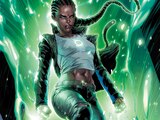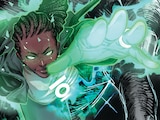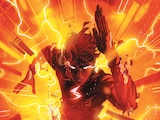The richness of the DC Universe is enhanced by characters like Martian Manhunter. As the last surviving Green Martian of Mars, J’onn J’onzz experienced not only the genocide of his own people at the hands of the White Martians, but the excruciating silence on his planet afterwards. However, with his strong telepathic powers and empathetic personality, J’onn has found community and connection with both aliens and humans alike on Earth.
One of the biggest twists in Supergirl’s first season was the reveal that Department of Extranormal Operations director Hank Henshaw, played by David Harewood, was actually Martian Manhunter posing as the deceased Henshaw. Previously, Henshaw, along with Supergirl’s adoptive human father Jeremiah Danvers, had been sent on a mission to recover an alien living on Earth. That alien turned out to be Martian Manhunter. While J’onn J’onzz only had peaceful intentions, a scuffle broke out between Danvers, J’onn and Henshaw, resulting in Henshaw’s death and the apparent demise of Danvers. With his place on Earth now in greater jeopardy, J’onn made the decision to assume Henshaw’s form, along with his role as the director of the DEO.
After Martian Manhunter revealed the truth to his allies at the DEO, he continued to appear in human form as a Black man. As J’onn would explain several times across the series, his decision to continue living as Black on Earth was not one made lightly. David Harewood’s nuanced performance as J’onn brings core elements of Martian Manhunter’s character into renewed focus, identifying Blackness as a unifying experience that even non-humans like J’onn J’onzz relate to.

Harewood’s turn as Martian Manhunter would not be the first time that a Black actor played J’onn J’onzz. In Justice League and Justice League Unlimited, J’onn was voiced by actor Carl Lumbly, who also appeared on Supergirl as Martian Manhunter’s father, M’yrnn J’onzz. Since then, Martian Manhunter has often appeared in human form in animated DC projects as a Black man, honoring this legacy forged by Lumbly and Harewood.
For J’onn in Supergirl, being an alien on Earth meant being an outsider. Even though he could “pass” as a human, even living as a well-respected official like Hank Henshaw, Martian Manhunter still lived with the burden of his past. Despite his strength and fortitude as a leader, J’onn was understandably traumatized by his experiences on Mars during the Martian Civil War. Being persecuted on his home planet by the White Martians because of his appearance and heritage was undoubtedly an area where he could empathize with the late Henshaw and other Black Americans. Through living as a Black man, J’onn was able to find an analogous way to express his inner truth.

As anti-alien sentiment grew on Earth over the course of Supergirl, Martian Manhunter’s decision to live as a Black man brought him insight into human society. In the season six episode “Blindspots,” J’onn says, “I came to this planet as a Martian, and in my heart, I’ve always been more Martian than anything. But I have chosen to wear the face of a Black man for a very long time now. I could’ve changed races. I could’ve changed into someone else entirely. But if I’m honest, wearing this skin has made me feel most like an alien on this planet—feeling like I don't belong. Never quite getting comfortable with the idea that this really is my home.”
Even though he’s lived among humans in a human form, living as a Black man brought parallel experiences to light that reminded J’onn of his alien background. This journey for the character expands our understanding of Blackness, examining it on a cosmic level.
If the defining legacy of aliens in science fiction and pop culture is their ability to shed light on our humanity, on the stuff that makes us us, then Martian Manhunter radically includes Black people specifically as part of that equation. And this is important. Within the narratives of alien and human contact permeating our culture, there’s often been a certain colonial dynamic at play that calls to mind the European “discovery” of the Americas. But Supergirl’s Martian Manhunter eschews this entirely by having J’onn refuse to conform to a standard of whiteness.

Supergirl’s presentation of Martian Manhunter was revolutionary because it established how an alien refugee like J’onn J’onzz could find comfort and safety among Black people, history and culture. It’s an idea that encourages us to think about the significance of Blackness with a new perspective. From this viewpoint, we can see how Blackness fosters a sense of empathy, which would undoubtedly be important for a telepath like Martian Manhunter. It’s gratifying to know that one of the DC Universe’s greatest heroes can find a sense of home within the Black community.
In choosing to live as a Black man, Supergirl’s Martian Manhunter firmly established that he was supportive of all those who experienced injustice. For J’onn, presenting as Black made the parallels between Martian Manhunter and Black history and experiences in America a textual one, rather than a metaphorical connection.
I’ve long related to alien characters like Supergirl and Martian Manhunter because of the way that their alien identities uniquely express my own experiences and family history. They too carry the stress that one day they’ll be “discovered” as “different,” alongside the anxiety that their acceptance by society has an expiration date. But with David Harewood’s performance as Martian Manhunter, I can truly feel a sense of honor placed towards the significance and legacy of Martian Manhunter among BIPOC folks.
Jules Chin Greene writes about comics, TV, games and film for DC.com, and his work can also be found at Nerdist, Popverse and Multiverse of Color. You can follow him on Bluesky at @JulesChinGreene and on Instagram at @infinitevibes.
NOTE: The views and opinions expressed in this feature are solely those of Jules Chin Greene and do not necessarily reflect those of DC or Warner Bros. Discovery, nor should they be read as confirmation or denial of future DC plans.




















